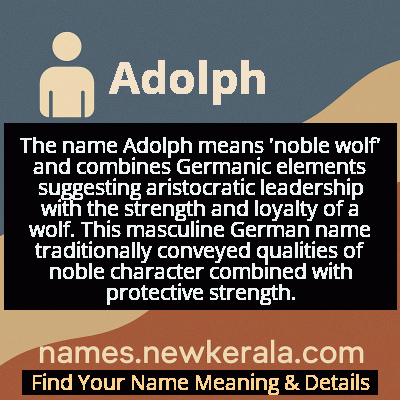Adolph Name Meaning & Details
Origin, Popularity, Numerology Analysis & Name Meaning of Adolph
Discover the origin, meaning, and cultural significance of the name ADOLPH. Delve into its historical roots and explore the lasting impact it has had on communities and traditions.
Name
Adolph
Gender
Male
Origin
German
Lucky Number
2
Meaning of the Name - Adolph
The name Adolph means 'noble wolf' and combines Germanic elements suggesting aristocratic leadership with the strength and loyalty of a wolf. This masculine German name traditionally conveyed qualities of noble character combined with protective strength.
Adolph - Complete Numerology Analysis
Your Numerology Number
Based on Pythagorean Numerology System
Ruling Planet
Moon
Positive Nature
Diplomatic, friendly, artistic, empathetic.
Negative Traits
Over-sensitive, moody, indecisive, prone to self-pity.
Lucky Colours
Green, cream, white.
Lucky Days
Monday.
Lucky Stones
Pearl, moonstone.
Harmony Numbers
1, 3, 4.
Best Suited Professions
Diplomats, mediators, caregivers, artists.
What People Like About You
Cooperative spirit, friendliness, artistic talent.
Famous People Named Adolph
Adolph Hitler
Political leader
Leader of Nazi Germany, initiated World War II and the Holocaust
Adolph Rupp
Basketball coach
Legendary University of Kentucky basketball coach with 876 career wins
Adolph Menzel
Artist
Renowned German painter and illustrator of the Realist school
Adolph Ochs
Newspaper publisher
Publisher of The New York Times who established its journalistic standards
Name Variations & International Equivalents
Click on blue names to explore their detailed meanings. Gray names with will be available soon.
Cultural & Historical Significance
The name's cultural significance extends beyond mere naming conventions to illustrate how language carries historical memory. In German-speaking countries today, the name is virtually taboo, representing one of the most striking examples of how a single historical figure can transform cultural symbols. The name Adolph now serves as a cultural reference point for discussions about historical responsibility, the power of association, and how societies process traumatic historical events through language and naming practices.
Extended Personality Analysis
Historically, individuals named Adolph were often perceived as possessing leadership qualities, strength of character, and noble bearing. The name's meaning of 'noble wolf' suggested someone with both aristocratic dignity and primal strength—a leader who could command respect while demonstrating protective instincts toward their community. These individuals were thought to embody the wolf's positive attributes: loyalty to family and group, strategic intelligence, and the ability to thrive in challenging circumstances. The combination of 'noble' and 'wolf' created an image of someone who balanced civilized refinement with untamed power, making natural leaders in various fields from military command to business leadership.
However, modern associations have significantly complicated these traditional personality attributions. The historical weight of the name now often overshadows any positive characteristics it might have originally conveyed. In contemporary understanding, the name carries connotations that make personality assessments challenging, as it's difficult to separate the name from its most famous bearer. This demonstrates how cultural context and historical events can fundamentally reshape the perceived personality traits associated with a name, regardless of its original meaning or the individual characteristics of people who bear it.
Modern Usage & Popularity
In contemporary times, the name Adolph has become extremely rare and is generally avoided in most Western countries due to its strong association with Adolf Hitler. In Germany and Austria, the name is virtually nonexistent among newborns and is subject to legal restrictions in some contexts. While the name occasionally appears in historical contexts or among older generations, modern parents overwhelmingly choose alternative names with similar meanings or sounds. The name's usage has declined by over 99% since the 1930s, and it now ranks among the least-used traditional German names globally. Some individuals with the name have chosen to use middle names or nicknames to avoid the historical baggage associated with 'Adolph.' The name's modern usage serves as a powerful example of how historical events can permanently impact naming trends and cultural practices.
Symbolic & Spiritual Meanings
The name Adolph carries profound symbolic weight as one of the clearest examples of how a name's meaning can be completely transformed by historical events. Symbolically, it represents the power of association to override etymological meaning—where 'noble wolf' has been replaced by associations with tyranny, genocide, and historical trauma. The name serves as a cultural symbol of how language and naming practices are deeply connected to collective memory and historical consciousness. It also symbolizes the complex relationship between individual identity and historical legacy, demonstrating how a single historical figure can permanently alter the cultural reception of a name that had been used for centuries. The name now symbolizes the enduring impact of historical trauma on cultural symbols and the responsibility that comes with historical memory.

